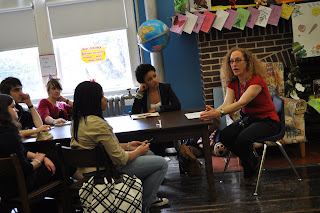Day 3, NOLA
Wednesday, St. Patricks Day, we saw a panel of teachers talk at the Green Charter School (a beautiful school that had an incredible garden outside and kitchen inside and is often referred to as the “Edible School Yard”). The teachers on the panel were a great range, and included three women who had been working in the New Orleans Public Schools for decades and had been fired after the hurricane, a teacher who had worked in the schools before and now taught physical education at the Green Charter, and a Teach For America teacher from New Jersey who was in her second year of the program.

Towards the end of what was a very powerful, infor- mative, passionate discussion of the school system, one of the “forced to retire” teachers stated that the school system is now a “replica of colonialism”. I immediately saw her point and her frustration in trying to work with a system that was basically calling the schools she had known, loved and given her dedicated work to a complete failure, something that needed to be replaced and taken over.

“Take over” is literally the language that people, from all sides of the situation, use to describe what the Recovery School District did, essentially when hurricane Katrina hit, but before as well. Since R.S.D. started in 2003, they were actually put in place to take over and rebuild the schools in New Orleans that the state of Louisiana saw as so drastically failing that they could no longer be city-run schools. With all the information we have seen, all the places we have been, all the articles we have read, I can see that many schools in New Orleans pre-Katrina were not performing as schools. They had some committed teachers, and there were good public schools, but there were also a huge number of people losing hope, inspiration and motivation, and failing to provide the necessary education for the children of the city. This is why the state decided to “take over” the schools. “Take over” is an inherently colonial word. The state took over the city schools, and said that they would not continue to do things the way they had been doing them for years, but would learn how to do them the way the state wanted.

When the teacher I mentioned above made her statement, she was aware of the harshness of her words. She went on to explain that what she meant was, the state of Louisiana came into the schools of New Orleans, where they did not have a previous relationship or prior experience, and said that they would take care of what the school, students, teachers and basically the community, “needed”. The illegitimacy of these supposed needs is where this teacher saw the replication of colonial tendencies.
Today, we saw several charter schools. The first was called ARISE Academy and is currently taking over a public school, which was referred to as Drew. These schools really made me think of the colonial model the entire time we were there. The women we met with at the school are from New Schools for New Orleans, a program that really did a lot to open new schools after the hurricane. They first talked to us for about an hour about the charter model they were working within and how it worked in a school building where two separate districts, two separate administrations, two separate schools, are operating at the same time.

The things that really stood out to me, and I think to many of my classmates, were the ways in which ARISE Academy seems to be actively ignoring who its students are, and the awkward situation they are navigating in the combined school building. They told us the stakeholders in their school were the superintendents, the principals, the state superintendent, and local business – people who need employees to be coming up through the schools in the city. This worried me, since they neglected to mention students, parents, or the community in their list. They also informed us that in their school students needed to leave their issues at home, their community, their family, behind, and be separate from that at school. This is absurd to me! To ask students to forget their identities, their histories, their lives, when they come into school, means asking them to remove themselves from the very organism that is this city. This is colonialism. What else did colonists do but to try to wipe out the backgrounds and original beliefs of native communities?

















































